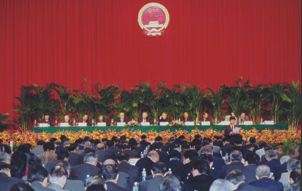China’s legislatureBy Billy Lam Deputies to the people’s congresses of counties, townships, municipal districts and “cities not divided into districts” are elected directly by the citizens. Deputies to the National People’s Congress and to those of provinces are elected by the people’s congresses of the next lower level. At the level of the National People’s Congress, the process is supervised by the NPC’s Standing Committee. There are no direct elections at the provincial or national levels. According to Chinese electoral law, all citizens of the People’s Republic of China who have reached the age of 18 shall have the right to vote and to stand for election.
Courtesy of Express NewsAs at the national level, the elections of deputies to local people’s congresses are supervised by the standing committees of the respective regions. The number of candidates for deputies are restricted by Article 30 of the electoral law. Hong Kong represents an exception to some of these rules. Because Hong Kong has no people’s congress, it also has no local standing committee. Hence, the election of delegates from Hong Kong to the National People’s Congress is overseen by the NPC’s Standing Committee. For a person to have become a candidate for the NPC from Hong Kong late last year, he or she was required to get at least 10 nominations from Selection Panel members. The Selection Panel was comprised of members of the 8th National Committee of the Chinese People’s Political Consultative Conference as well as members of the Provisional Legislative Council of Hong Kong. Dr. Zhu Guobin, research assistant professor in the Department of Law at City University, said a preliminary election may provide an opportunity for nominees to manipulate the election. “Article 29 of the Election Law states that anyone may become a candidate, provided that he has the recommendation from a joint group of at least 10 voters,” said he. “But in practice, according to the political ecology of communist China, only the candidates nominated by the Communist Party are politically ‘righteous’ (appropriate).” Dr. Zhu’s research reveals that most Mainland candidates are nominated by the Communist Party. However, Dr. Li Che-lan, assistant professor in the Department of Public and Social Administration at City University, does not think that the Election Law is undemocratic. “Although there are only indirect elections at the upper (national and provincial) levels, the deputies may still be representatives if direct elections at the lower levels operate well,” said Dr. Li. “According to recent reports, democracy has been achieved at the grassroots level in China. Certain towns have experienced efficient direct elections,” said she. In any case, Dr. Louie Kin-Sheun of the same department at City University believes that China is still unprepared for a direct election at the national level. He said direct elections may be practicable in cities like Shanghai and Beijing, since there are well-educated populations and advanced information technologies. “However, there are still many backward provinces in which direct elections cannot be carried out,” said he. The first Election Law, promulgated in 1979, requires candidates to publicise themselves. Nowadays, this practice is no longer necessary. According to article 33 of the current Election Law, information about candidates is given to voters by the political parties and deputies that have nominated them. Said Dr. Zhu: “I do not agree with such a settlement since it reduces opportunities for voters to have direct contact with candidates.” Another controversy concerns a separate electoral process for soldiers in the People’s Liberation Army. Article 5 states, “Elections shall be conducted separately in the People’s Liberation Army.” The PLA became a functional group since the promulgation of “Measures for the Election of Deputies from the Chinese People’s Liberation Army to the National People’s Congress and Local People’s Congresses” in 1981. Prof. Lee Nan Shong of the Department of Government and Public Administration at The Chinese University of Hong Kong said, “The soldiers have to be stationed in different parts of the country. After a certain time, they have to shift from one place to another. “To ensure that their political rights would not be ignored due to the constant shifting, the government identifies the PLA as a functional group.” Dr. Li said, “The Chinese Communist Party obtained national sovereignty and upholds the status quo with the military. That is why the PLA is given a unique position.” Dr. Louie said, “Such a measure would be unpopular in other countries.” [Democrats Alienated||China
Law Market] |
